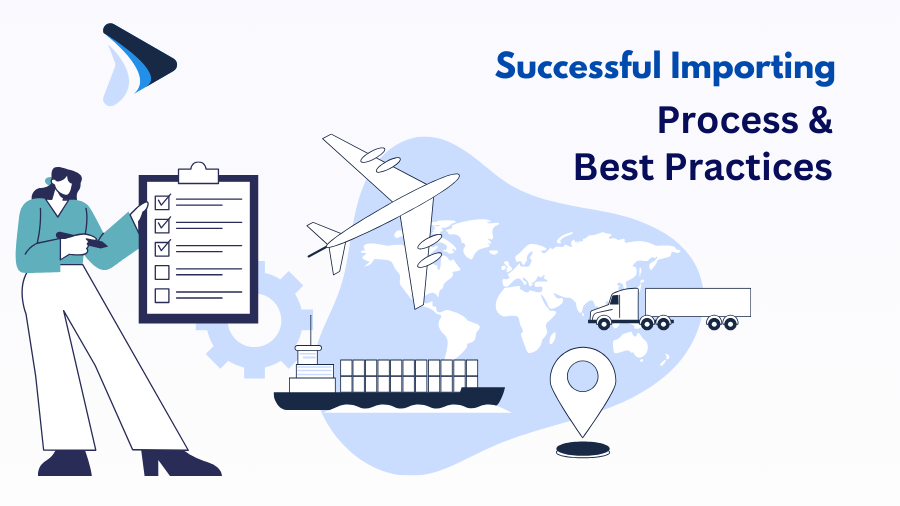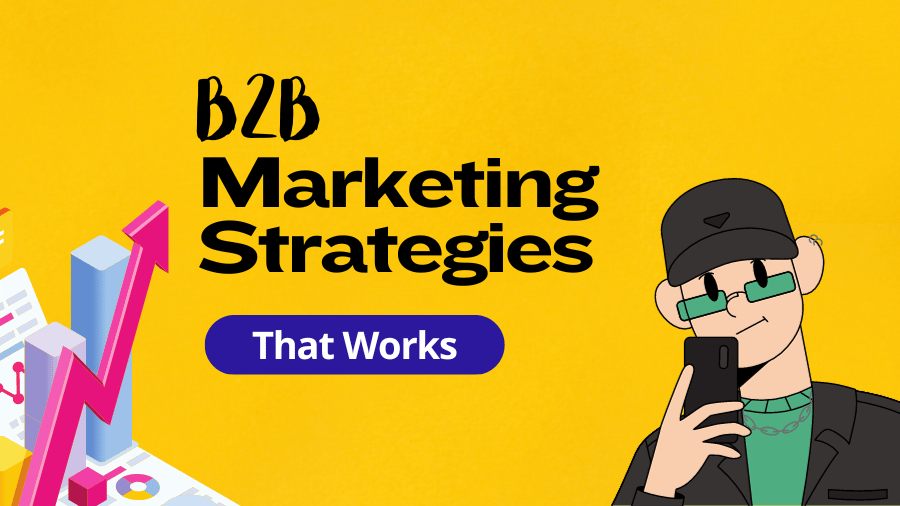
Welcome to the exciting world of B2B marketing, where innovative strategies can let you get soaring success. Moreover, In this digital era, mastering B2B marketing is essential for businesses aiming to thrive and expand.
B2B, or Business-to-Business, marketing includes the promotion of products and services from one company to another. Imagine you make the best leather items in town, but no one knows about it. B2B marketing is how you tell the world that you've got the leather items they've been searching for.
In this article, we'll explain to you the different parts of B2B marketing. Along with that, you will also learn the strategies that give businesses a competitive edge. From understanding your audience to using tools and technologies, we'll explore the secrets that make B2B marketing not just effective but exceptional.
Table of Contents
B2B Marketing Strategies: An Overview
Before we start on this B2B marketing guide, let's understand what B2B marketing strategies really are. In the world of business, strategies are like the roadmap guiding you to your destination.
B2B marketing strategies, in simple words, are plans that are designed to promote products or services from one business to another. It's all about showing what you have and convincing other businesses that they need it. Think of it as the effective storytelling at a grand market fair, telling a story for your product.
These strategies include different kinds of techniques that help in building brand awareness and generating leads. Along with that the goal is to convert those leads into loyal customers. In short, B2B marketing strategies help to establish a strong relationship between businesses.
Analysing data and consumer behaviour patterns is a crucial part in creating these strategies. Numbers and graphs become our friend in this journey. For instance, did you know that businesses that personalise their online experiences see an average increase in sales of 19%? It shows us the importance of personalization in B2B marketing.
Moreover, the analysis doesn't stop there. You need to study market trends, competitor moves, and customer preferences. All these elements collectively shape the strategies we create. It makes your strategies more targeted and effective.
B2B Marketing Examples
Alright, let's get into the real world of B2B marketing and see these strategies in action.
Example 1: Adobe's "CMO.com"
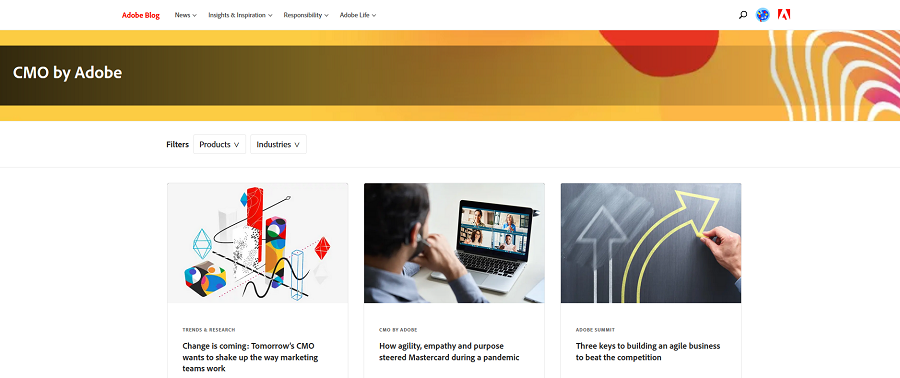
Adobe understood the power of providing value to its target audience. They created "CMO.com," a platform that offers valuable resources for Chief Marketing Officers (CMOs). It's a treasure of knowledge about digital marketing, insights into industry trends, and expert advice. By doing this, Adobe showcased its expertise and positioned itself as an authority in the digital marketing space.
Example 2: LinkedIn's "Marketing Solutions"

LinkedIn, leverages its own network to reach potential B2B clients. Their "Marketing Solutions" is a great example of effective B2B marketing technique. LinkedIn uses sponsored content, sponsored InMail, and display ads to connect businesses with their target audience. The key here is the precise targeting options, making sure that your message reaches the right eyes.
Example 3: Salesforce's "State of Marketing" Report
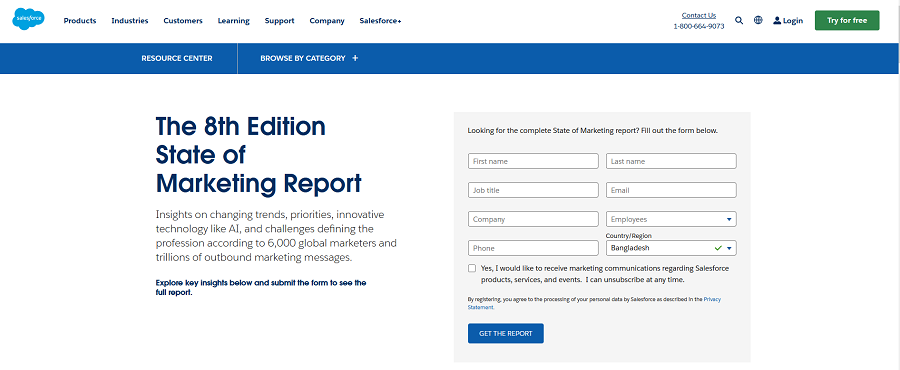
Salesforce, a giant in customer relationship management (CRM), produces an annual "State of Marketing" report. This report explains the strategies, trends, and challenges faced by marketers globally. By offering this valuable resource for free, Salesforce positions itself as an industry expert and also collects valuable data for future strategies. It's a win-win!
What do these examples tell us? They show us that providing value and knowledge to your audience is a powerful B2B marketing strategy. It's all about nurturing relationships and positioning your brand as a trustworthy advisor.
Top 10 B2B Marketing Strategies
Alright, let's get into the top 10 B2B marketing strategies that work all the time in the business world. These strategies have proven to be effective, driving success for businesses.
1. Research
Market research is like a map for your B2B marketing projects. It includes understanding your audience, their pain points. It's about knowing your potential customers on a personal level.
2. Niche-driven Strategy
Being a jack-of-all-trades won't be effective in B2B marketing. Niche marketing is like being the specialist doctor for a specific illness. It means focusing on a particular industry, product, or service category and becoming expert in it.
3. A High Performance Website
Your website is often the first touchpoint with potential clients. Which is why, It needs to be exceptional. It should tell your story, showcase your products or services. At the same time it should be easy to navigate.
A study by Adobe found that given 15 minutes to consume content, two-thirds of people would rather read something beautifully designed than something plain.
4. Search Engine Optimization (SEO)
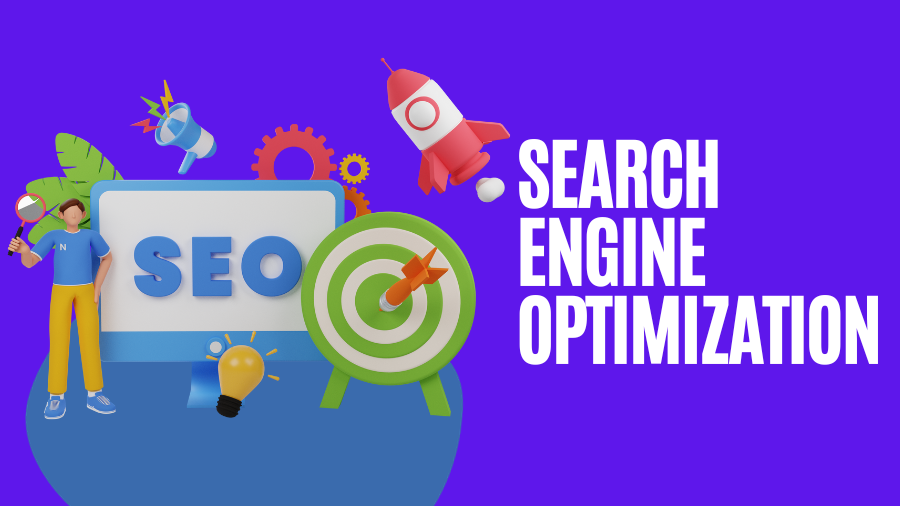
If your business is a hidden gem; SEO is the map to find it out. It's about optimising your online content to be easily found by search engines. It makes your business visible to those seeking what you offer.
5. Social Media

Social media isn't just for sharing cat videos; it's a goldmine for B2B marketing. Platforms like LinkedIn, Twitter, and even Facebook can be powerful tools to showcase your expertise. At the same time you could share valuable content, and engage with your potential customers.
6. Advertising
Advertising, both online and offline, can significantly boost your brand visibility and attract potential B2B customers.
According to Statista, global digital advertising spending is projected to reach $517.51 billion in 2023. It shows the power and reach of advertising in today's digital age.
7. Referral Marketing
Referrals are like gold in B2B. A satisfied customer recommending your services to another business is super powerful. That’s why you need to encourage your regular clients to spread the word.
According to a Nielsen survey, 92% of consumers believe suggestions from friends and family more than advertising. That trust factor is key in referral marketing.
8. Marketing Automation, CRM, and Lead Nurturing
Automation tools streamline your marketing efforts, making them more efficient. A Customer Relationship Management (CRM) system ensures you keep track of every interaction with your clients. As a result it enables personalised and timely responses.
A study by Nucleus Research found that for every dollar spent on CRM, the average ROI is $8.71. Efficiency and organization pay off.
9. Testing and Optimization
In B2B marketing, it's vital to keep experimenting. Test different strategies, messages, and channels to see what works best for your audience. Optimising based on the data you gather is key to long-term success.
A/B testing, where you compare two versions of a webpage, has been found to generate up to 30-40% more leads, according to HubSpot.
10. Analytics and Reporting
Measure Your Efforts: It's not just about doing things; it's about knowing what works and what doesn't. Analyzing your marketing efforts through various softwares and platforms helps you understand ROI and adjust strategies accordingly.
According to Gartner, businesses that are driven by data and analytics are 3 times more likely to report substantial improvements in decision-making.
Leveraging B2B Marketplaces: A Gateway to Business Success
In this digital age, businesses are constantly seeking new ways to succeed. One such route is through B2B marketplaces. These platforms act as bustling marketplaces where businesses, large and small, converge to buy and sell products and services. Think of it as a grand business expo, but on the internet and accessible to anyone, anywhere.
B2B marketplaces are online platforms that improve transactions between businesses. They bring together sellers, manufacturers, wholesalers, and retailers, creating a vast and interconnected network. These platforms offer a centralised hub where businesses can showcase their offerings to a wide and diverse audience.
The global B2B e-commerce market is anticipated to reach $20.9 trillion by 2027, at a CAGR of 17.5%. This underscores the exponential growth and significance of B2B marketplaces.
How B2B Marketplaces Helps B2B Marketing
In the ever-evolving landscape of business-to-business (B2B) marketing, staying competitive and reaching your target audience is crucial. One powerful tool that has emerged to facilitate this process is B2B marketplaces.
B2B marketplaces provide platform for businesses to exhibit their products and services. It's like having a stall in the busiest market of the world, but in the digital world.
A study by McKinsey shows that more than 75% of B2B buyers and sellers now prefer digital self-serve and remote human engagement over face-to-face interactions. B2B marketplaces provide service to this growing preference for digital interactions.
These marketplaces streamline the procurement or buying process, making it efficient and cost-effective. Businesses can compare products, prices, and B2B suppliers seamlessly, all in one place.
B2B marketplaces equip businesses with tools and features to make informed decisions. They provide essential data and insights, enabling businesses to choose the best deals.
A survey by Avionos found that 69% of B2B buyers expect their vendor's website to offer the same level of intuitive online shopping experiences they encounter as consumers. B2B marketplaces align with this expectation.
B2BMAP: A Prime Example
B2BMAP stands as a prominent B2B platform, embodying the essence of a B2B marketplace. It's a platform that connects businesses on a global scale, providing a user-friendly interface and advanced search capabilities.
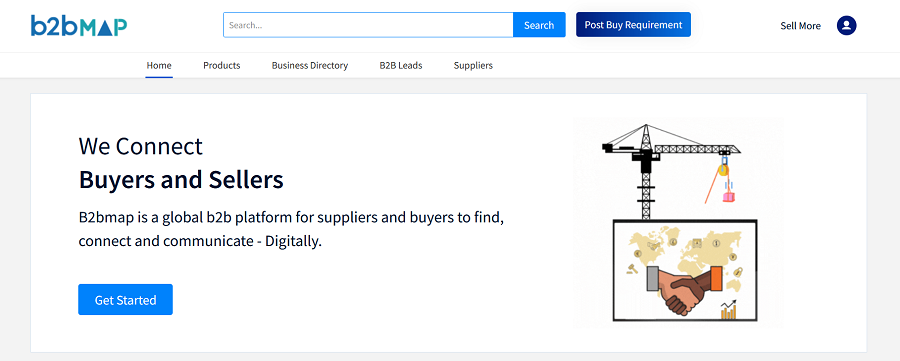
B2BMAP empowers both suppliers and buyers. In simple words, Suppliers gain a broader market reach, expanding their potential customer base. On the other side, buyers benefit from a vast array of options, competitive prices. At the same time the buying experience is seamless as well.
A study by Accenture found that 55% of B2B buyers appreciate personalised recommendations based on their past purchases. B2bmap.com employs personalised features that enhance the buying experience.
Using a B2B marketplace like B2BMAP is a strategic move for businesses. Because, by joining a good B2B marketplace, businesses get to optimise their operations, expand their network, and drive growth in the digital marketplace. It's a world of opportunities and connections, all just a click away.
Implementing Your B2B Marketing Strategy
Now that we have effective B2B marketing strategies and the potential of B2B marketplaces. It's time to roll up our sleeves and get into the practical side. In the following section we are going to learn how to implement these strategies in your B2B marketing journey.
1. Understand and Relate to Your Audience
The secret of successful B2B marketing lies in understanding your target audience deeply. Ask questions like, who are they? What challenges do they face? What solutions are they seeking? Tailor your messaging and strategies to resonate with their needs.
According to Salesforce, 57% of customers have stopped buying from a company because a competitor provided a better experience. Understanding your audience contributes to providing that superior experience.
Personalise your interactions, emails, and content based on your audience's behaviour. Show them that you're not just another business; you're a partner genuinely interested in their success. A study by SmarterHQ revealed that 72% of consumers say they now only engage with personalised marketing messages.
2. Discover Competitor Weaknesses
Studying your opponents is crucial before applying any marketing strategies. First, identify your competitors, understand their strategies, and pinpoint their weaknesses. Use this information to position your business uniquely and offer what they can't.
Competitor weaknesses often represent market opportunities. If a competitor lacks in customer service, ensure your support team is top-notch. If they're not utilising a specific marketing channel effectively, make it your strong suit.
3. Use B2B Data for Better Targeting

Collect and analyze data to understand your audience better. From their preferences to their purchasing behaviour, data provides the insights you need to target effectively.
Use advanced analytics tools to gather insights from customer interactions, website behaviour. Analyse this data to better optimise your marketing strategies.
4. Don't Cut Corners with Your Customer Journey
Make the customer journey as enjoyable, smooth as possible. From the first interaction to the final sale, ensure that every touchpoint provides value and is effortless for the customer.
Map out your potential customer journey. Identify the touchpoints and opportunities for improvement. Optimise each stage to make it a delightful experience.
6. Email for Smart Devices
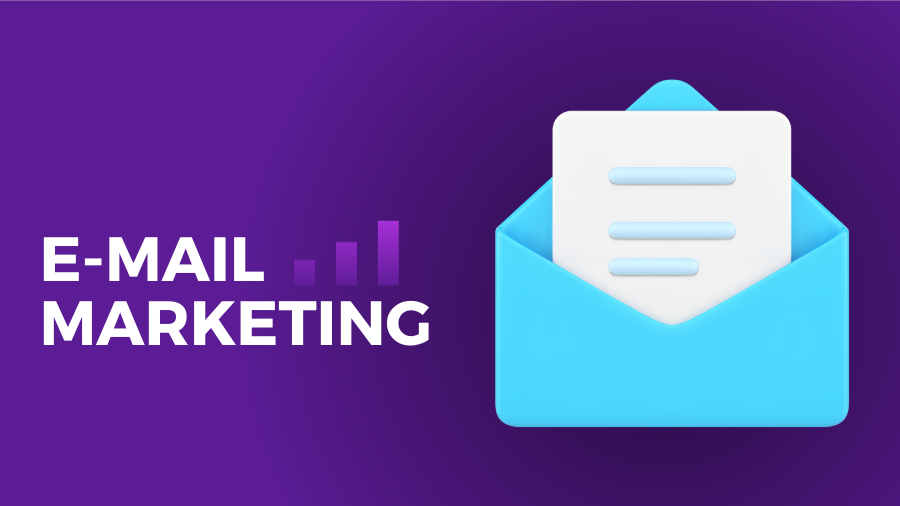
We live in a mobile-centric world. Ensure that your emails are not only aesthetically pleasing but also functional and easily accessible on mobile devices. Most of your audience will be viewing emails on their smartphones.
Use responsive design techniques to ensure that your emails adapt seamlessly to different screen sizes. It will provide a consistent and engaging experience.
7. Choose the Right Tech Stack
Your tech stack is like your best tool. Choose the right tools and platforms to automate, streamline, and optimise your marketing efforts. CRM systems, email marketing software, analytics tools—these are the aspects you need to focus on.
Ensure your tech stack components integrate smoothly with each other. This facilitates data storage and flow and enables a unified view of your marketing efforts.
8. Make Value-Driven Content Your Marketing Goal
Content is the heart of your B2B marketing strategy. Focus on creating valuable, informative content that educates your audience and positions you as an authority in your industry.
A survey by Content Marketing Institute found that 71% of B2B marketers say a key part of their content strategy is to build credibility and trust with their audience.
Identify the pain points of your audience and tailor your content to address those. Show them how your product or service can solve their problems.
Final-Cut
In the fast-paced world of B2B marketing, strategies are the compass guiding businesses to success. From research-driven insights to getting into platforms like B2BMAP, the roadmap is always changing.
B2B marketplaces like B2BMAP, have emerged as central hubs of business interaction in today's world. It offers wider reach, efficient buying, and informed decision-making.
When making marketing strategies, make sure to focus on understanding and optimising your customer journey. In the end B2B marketing is all about staying customer-centric.
Frequently Ask
B2B marketing involves promoting products and services from one business to another. It works by identifying target business audiences and crafting tailored strategies to meet their needs and solve their challenges.
An effective B2B marketing strategy comprises understanding your audience, leveraging data-driven insights, employing digital tools, crafting compelling content, and measuring performance to refine your approach.
B2B marketplaces transform businesses by providing a centralized platform for buying or selling, expanding reach, enabling efficient transactions, and enable informed decision-making through access to a wide range of products and services.
To implement B2B marketing strategies, start by conducting market research, defining your target audience, creating valuable content, utilizing digital channels, and measuring results. Tailor your approach based on the unique needs of your business.
Emerging trends in B2B marketing include personalization, account-based marketing (ABM), utilize B2B marketplaces, video marketing, and sustainability initiatives. To stay ahead, continually adapt your strategies, invest in innovative technologies, and stay informed about industry shifts and customer preferences.
Grow Your Business Online
Use Our Buyer Seller B2B Marketplace to Source Your Product or Increase Sells & Revenue by Getting New Buyers.

